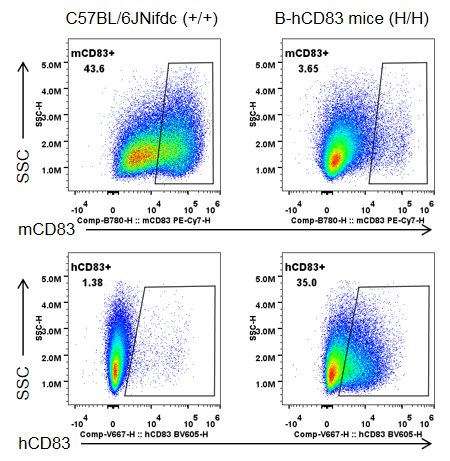B-hCD83 mice
| Strain Name |
C57BL/6-Cd83tm2(CD83)Bcgen/Bcgen
|
Common Name | B-hCD83 mice |
| Background | C57BL/6 | Catalog number |
111376 |
|
Related Genes |
BL11, HB15 |
||
|
NCBI Gene ID |
9308 | ||
- CD83 is a member of the immunoglobulin superfamily, consisting of a single extracellular IgG-like domain, a transmembrane region, and a cytoplasmic domain. Human CD83, CD40, CD80, CD86 and HLA class I and II molecules are important markers of DC maturation in the presence of IL-4 and GM-CSF. However, CD83 is expressed not only on mature DC, but also on activated B cells and T cells. In addition, CD83 can also be detected in the cytoplasm of monocytes, macrophages and immature DC, and is rapidly expressed on the cell surface under the stimulation of LPS. The study suggests that CD83 may play an important role in regulating the immune response. CD83 was degraded in virus-infected DC and its ability to induce allogeneic T cell proliferation was reduced. In addition, DC that inhibited CD83 expression had a reduced ability to stimulate T cells. CD83 has homologous trimer structure and soluble CD83 (sCD83), and sCD83 is released by immature DC and B cells. Experiments in mice showed that sCD83 inhibited DC-mediated T cell stimulation in vitro and had immunosuppressive effects in vivo. Serum levels of soluble CD83 are elevated in many patients with hematologic malignancies. CD83 may be a potential therapeutic target for autoimmune diseases such as tumors, arthritis and myeloid leukemia.
- Protein expression analysis: Mouse CD83 was only detectable in BMDC from wild-type C57BL/6JNifdc mice. Human CD83 was only detectable in BMDC from homozygous B-hCD83 mice but not in wild-type mice
Targeting strategy
Gene targeting strategy for B-hCD83 mice. The exons 1-4 of mouse Cd83 gene that encode signal peptide and extracellular domain are replaced by human counterparts in B-hCD83 mice. The genomic region of mouse Cd83 gene that encodes cytoplasmic portion and transmembrane domain is retained. The promoter, 5’UTR and 3’UTR region of the mouse gene are also retained. The chimeric CD83 expression is driven by endogenous mouse Cd83 promoter, while mouse Cd83 gene transcription and translation will be disrupted.

Strain specific CD83 expression analysis in wild-type mice and homozygous B-hCD83 mice by flow cytometry. BMDCs were collected from wild-type C57BL/6JNifdc mice (+/+) and B-hCD83 mice (H/H) (male, n=1, 6-week-old) stimulated with LPS (1 μg/mL) for 20 h, and analyzed by flow cytometry with anti-mouse CD83 antibody (Biolegend, 121518) and anti-human CD83 antibody (Biolegend, 305336). Mouse CD83 was only detectable in wild-type mice. Human CD83 was only detectable in homozygous B-hCD83 mice but not in wild-type mice.









